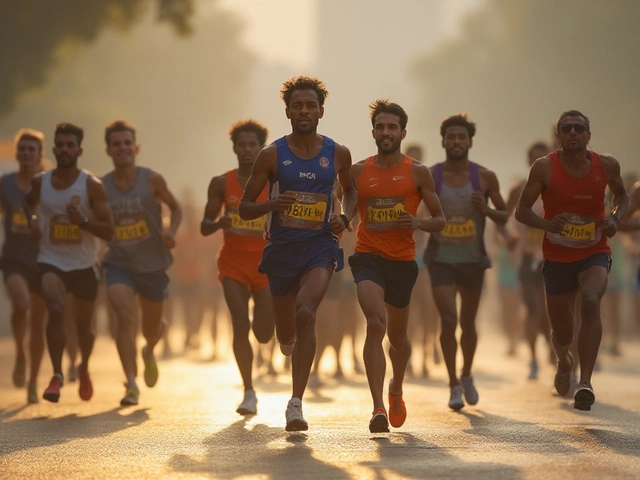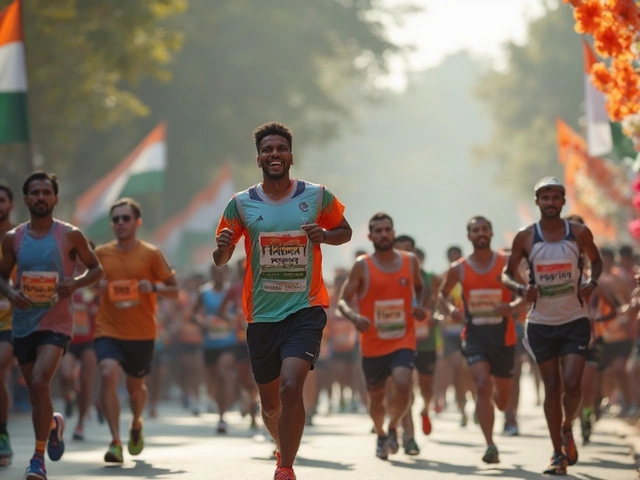If you've ever wondered if marathon runners eat like there's no tomorrow, you're not alone. It seems counterintuitive, but to tackle those grueling 42 kilometers, fueling up becomes a science. Let's break it down.
First up, calories. Marathon runners need a boatload more than the average person. We're talking about hundreds to thousands of extra calories, depending on their training intensity and goals. But it's not just about shoveling in food—quality matters.
Carbohydrates steal the spotlight here. They're like the superhero fuel—quicker to digest and ideal for providing the energy needed to conquer long runs. Think pasta, rice, and fruits. But don't sideline proteins and fats. These guys help with recovery and keep your body equipment in check.
Fun fact? Snack timing can be just as crucial as meal timing for runners. Remember, a well-placed banana or energy bar can be a lifesaver mid-run.
- Marathon Fuel 101: Calorie Needs
- Carbs: The Runner’s Best Friend
- Proteins and Fats: Not to Be Overlooked
- Sneaky Snacks and Meal Timing
- Hydration: More Than Just Water
- Real-Life Eating Tips from Marathoners
Marathon Fuel 101: Calorie Needs
Alright, let's talk calories. If you're a marathon runner, your calorie intake is gonna be way higher than the average Joe. Why? Because you're basically an engine burning through fuel like there's no tomorrow. But how much do you actually need?
For starters, the daily requirement varies per person. Factors like weight, age, gender, and training intensity come into play. But for many, the magic number floats between 2,500 to 3,000 calories on training days. Some elite runners even clock in at 4,000!
Why So Many Calories?
It's simple: running long distances demands energy, and lots of it. You need fuel not only for running but also for recovery, muscle maintenance, and just keeping up with daily functions.
Breaking Down the Calories
Here's where it gets nitty-gritty. Not all calories are equal. Marathon runners typically derive their energy from a specific breakdown:
- Carbohydrates: 60-70% of total intake. Think of carbs as your primary fuel source. They go straight to powering those legs.
- Proteins: 10-15%. Key for muscle repair, especially after those muscle-tearing runs.
- Fats: 20-30%. Provides a longer-lasting energy source, especially on slower-paced training days.
| Calorie Source | Percentage |
|---|---|
| Carbohydrates | 60-70% |
| Proteins | 10-15% |
| Fats | 20-30% |
Listening to Your Body
While these are standard guidelines, every runner's body reacts differently. It's crucial to listen to what your body needs. Feeling sluggish? Maybe adjust your carb intake. Too tired? Perhaps you need more fats for longer-lasting energy.
Remember, understanding your specific dietary needs can elevate your performance and make those long miles a bit more bearable!
Carbs: The Runner’s Best Friend
When it comes to marathon runners, carbs are like gold. They’re the body's go-to energy source, especially during those long, grueling runs. But why are they so critical?
First off, carbs are stored in the muscles and liver as glycogen, which is like your energy piggy bank. During a race, your body taps into these glycogen stores to keep you moving. Without enough glycogen, you might hit the infamous 'wall'—that dreaded moment when you feel like you can't go another step.
Smart Carb Loading
Carb loading isn't just a myth. Running experts swear by it as a pre-race game-changer. A few days before your race, increase your carb intake to up to 70% of your total calories. It's like filling your gas tank before a long drive.Wondering what to eat? Stick with familiar, easy-to-digest favorites. Some popular options include pasta, rice, and oatmeal. Bananas and sweet potatoes are also fantastic, providing quick energy and nutrients.
Race Day Strategy
On the big day, timing is everything. Eat a light, carb-rich breakfast about 3-4 hours before the race. Something like toast with honey or a bagel works well—nothing too heavy.During the race, popping a gel or a chewable carb snack every 30-45 minutes helps maintain those glycogen levels. This isn't the time to experiment with new products, though. Test them out during training runs to avoid any surprises.
Marathon nutrition is all about balance and being prepared. The right carbs at the right time can make your long run a whole lot smoother.
Proteins and Fats: Not to Be Overlooked
Carbs might be the star of the marathon show, but let’s not forget about proteins and fats. These nutrients play crucial supporting roles in a marathon runner's diet, helping with muscle repair and long-lasting energy.
Why Proteins Matter
Running taps into your muscles, especially during long sessions. That’s where protein steps in. It’s key for repairing tissue and building muscle strength. Most runners aim for about 1.2 to 1.6 grams of protein per kilogram of body weight daily. So, if you weigh 70 kg, you should target around 84 to 112 grams.
Simple choices like chicken breast, eggs, and even plant-based options like lentils and quinoa pack a punch. And don’t forget the post-run protein shake—it’s quick, effective, and gets the job done when you’re low on time.
The Role of Fats
Now, onto fats. Despite their bad rap, some fats are marathoners' secret hero. They provide that slow-burning energy ideal for distance running. Healthy options like avocados, nuts, and olive oil fuel you over those long periods of exertion.
Striking the right balance is key. Ideally, 20-35% of your daily caloric intake should come from fats, ensuring they're mostly the healthy kinds. Skimping on fats can leave you feeling drained and under-fueled, especially during the long-haul runs.
At the end of the day, protein and fat choices help keep a marathon runner not only in top form but ready to knock out miles with staying power. Mix and match the options to see what works best for your body’s unique needs.

Sneaky Snacks and Meal Timing
Timing is everything, they say, and when it comes to a runner's diet, this couldn’t be more accurate. You can't just eat whenever you please if you're gearing up for a marathon. Let's get into what really works.
Pre-run carbs are king. Having a small meal or a snack 30 to 60 minutes before hitting the pavement ensures your body's top fuel engine is charged up. Think toast with jam or a banana. These options are quick to digest and pack an energy punch without making you feel like a lead balloon.
"Fueling before a run is about more than just filling your tank. It’s about timing – injecting energy at just the right moments to maximize its benefits." – Jillian White, renowned sports nutritionist
And don't forget about sneaky snacks! These are the secret weapons for longer training runs. Ever heard of energy gels? They're small, handy packets of carbs designed to be consumed mid-run. The trick is to take one every 30-45 minutes during extended efforts.
Meal Timing Breakdown
- Morning Run: Quick carb-rich snack, like an energy bar, about 30 minutes beforehand.
- Midday Run: A balanced light meal about 1-2 hours before, incorporating carbs, some protein, and minimal fat, like a turkey sandwich with whole-grain bread.
- Evening Run: Snack on something light, similar to a morning run, but ensure dinner follows soon after to aid recovery.
It's also crucial to adapt your eating schedule to your personal routine. Some runners find they can perform on an empty stomach (a method called 'fasted running'), but it's not for everyone.
Remember, finding what works for you is the key to unlocking your best marathon performance. So don’t be afraid to try different strategies and tweak them to suit your unique needs.
Hydration: More Than Just Water
So, you've probably heard hydration is key for marathon runners, right? But here's the thing—aquatic replenishment isn't just about guzzling water. Sure, H2O is crucial, but when you're pounding the pavement for miles, you lose more than just plain old water.
Electrolytes: Your Secret Weapon
While sweating buckets, your body sheds electrolytes like sodium, potassium, and magnesium. These little guys help regulate muscle function and keep your body's systems balanced. Without them, hello cramps and fatigue! Sports drinks, electrolyte tablets, or even coconut water can be a runner's besties.
Timing Your Intake
Consuming the right fluids at the right time can make a huge difference. Pre-run, it's good to drink about half a liter of water. During runs, aim for about 150-300 ml every 20 minutes depending on the weather and your sweat rate. And don't forget to top up post-run to speed up recovery.
Listening to Your Body
Ever deal with sloshy stomach syndrome from chugging too much? Listen to your body. Thirst is a sign, but being constantly aware of how you're feeling is key. You don’t want to overdo it either; that's a one-way ticket to a condition called hyponatremia (fancy for diluted blood sodium).
Hydration in the marathon world is as much an art as it is a science. The right balance keeps you cruising past the finish line instead of cramping on the sidelines. So next time, think beyond just sipping water—mix it up with some electrolyte love!
Real-Life Eating Tips from Marathoners
Ever wonder how marathon runners really keep themselves fueled and energized? Let's peel back the curtain on their eating hacks, straight from the horses' mouths (or maybe their mouths stuffed with carbs).
Timing is Everything
Runners know that meal timing can make or break a training session. Marathon runners often swear by the '3-hour rule' before a run—having a good meal three hours before hitting the track. This gives your body just enough time to digest and make those calories useful.
Pre-Race Rituals
Bananas and peanut butter toast top the list of pre-race breakfasts. The carbs in the toast combined with the fat and protein from the peanut butter create a balanced snack that keeps energy stable.
Snack Attack Solutions
To keep energy levels steady over long distances, runners often carry compact snacks. Some favorites include:
- Energy gels
- Dried fruits
- Nuts and seeds
These aren't just tasty—they're practical because they're easy to carry and munch on the go.
Post-Run Refuel
Recovery meals are just as critical. Within 30 minutes post-run, many top runners will load up on protein shakes or chocolate milk. Why? These help in muscle recovery and are quick and convenient to prepare.
Fun Stats: Calorie Burn
On average, a marathoner will burn about 100 calories per mile. For a full marathon, that's roughly 4,200 calories—that's like five and a half Big Macs but nowhere near as fun.
| Distance (Miles) | Calories Burned |
|---|---|
| 1 | 100 |
| 13.1 (Half Marathon) | 1,310 |
| 26.2 (Full Marathon) | 2,620 |
So, if you're planning on joining the ranks of marathon runners, start by eating like one. Some tweaks to your meal plan could be the secret to crossing that finish line with a smile.



